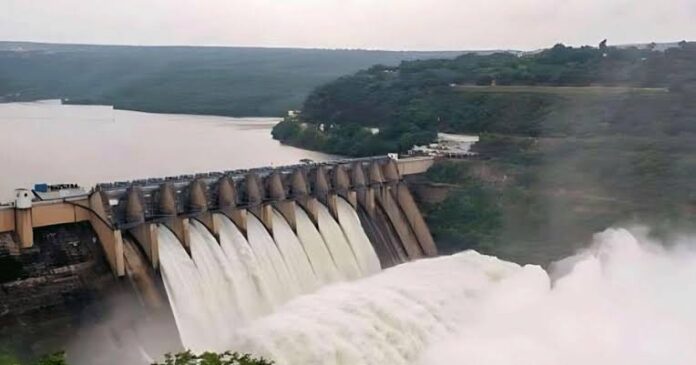The vital trade route connecting Adamawa and Taraba states in northeastern Nigeria has been severed after heavy flooding washed away a critical section of the road. Stranded passengers and frustrated drivers face long delays and economic hardship as the harvest season approaches.
The collapse occurred near Lafiya Lamorde, a border town with Gombe State. The bridge, originally built with a metal culvert to manage water flow, succumbed to the relentless floodwaters. Now, a gaping hole renders the road completely impassable for vehicles.
“The situation is dire,” said Adamu Dangombe, a stranded passenger. “Some people took a risky chance and tried to cross the washed-out section after waiting for hours for the water to recede. Others simply had to turn back, their journeys disrupted.”
Dangombe echoed a common sentiment – frustration with the lack of infrastructure maintenance. The government needs to prioritize completing this road,” he urged. “Every year, the Federal Road Maintenance Agency spends resources that could be used to prevent these disasters.”
The consequences of the road closure extend far beyond travel delays. With harvest season fast approaching, the economic impact is particularly concerning.
Both Adamawa and Taraba states are known for cattle rearing and major food crops,” explained Muritala Hassan, a driver affected by the road collapse. These goods are transported all over Nigeria and beyond. The government needs to fix this road urgently to prevent worsening the country’s food crisis.
The disruption to trade is evident. Trucks carrying essential goods are forced to find alternative routes, adding time and cost to their journeys. Local farmers worry about getting their produce to market on time.
The National Emergency Management Agency (NEMA) has deployed a team to assess the situation. They visited the site of the collapse in Lamurde Local Government Area, Adamawa State.
“This incident has caused significant disruption to trade and travel,” acknowledged NEMA in a statement. “Stranded commuters and goods are a major concern, as transportation between the two states has been severely affected.”
NEMA believes the collapse likely resulted from a combination of pre-existing structural weaknesses and the heavy seasonal rains. Director-General Zubaida Umar initiated a rapid assessment led by Mr. Musa Yakubu from NEMA’s Yola office. They are working closely with the Lamurde Local Government Area’s Emergency Management Committee.
Initial reports indicate significant damage to critical infrastructure, leading to transportation delays and safety risks. NEMA has advised local residents to avoid the affected area until further notice.
The closure of the Gombe-Yola-Jalingo highway is a stark reminder of the need for robust infrastructure maintenance in Nigeria. As floodwaters recede and the recovery process begins, the question remains: how long will it take to repair this vital lifeline connecting Adamawa and Taraba states? With the harvest season looming, a swift solution is critical to ensuring food security and alleviating the economic burden on residents and businesses in the region.



